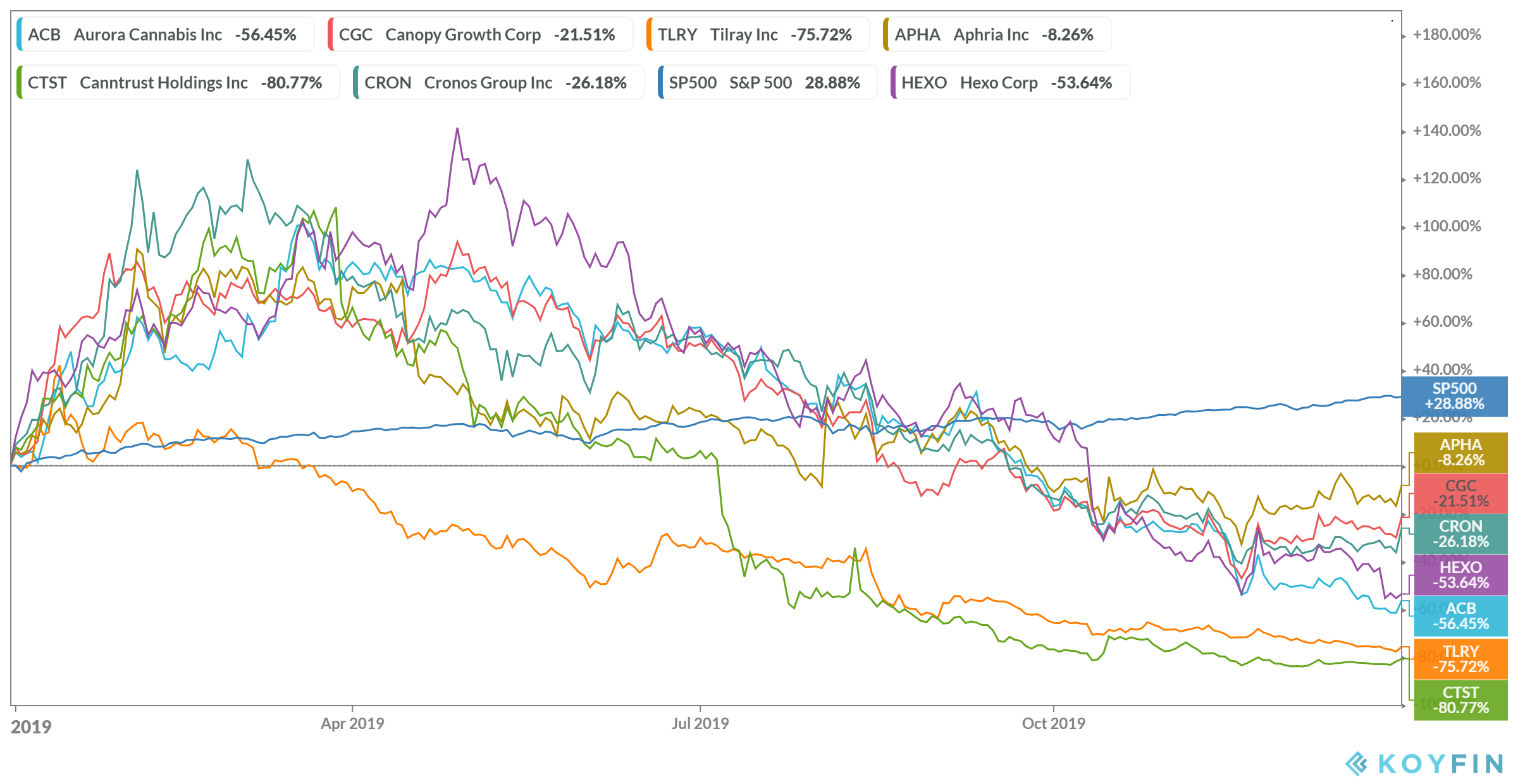
The cannabis industry got another shock on Thursday when Aurora Cannabis Inc. (NYSE: ACB) announced after markets closed that company founder and Chief Executive Officer Terry Booth would retire. Executive Chair Michael Singer was named interim CEO, effective immediately. Booth will remain on the company’s board and serve as a senior strategic adviser to the board.
In December, Aurora’s chief corporate officer, Cam Battley, resigned unexpectedly. At least one industry analyst, Cantor Fitzgerald’s Pablo Zuanic, said that Battley was forced out.
Aurora Cannabis shares took a beating Thursday, closing down 5.6% on rumors of Booth’s departure, and trading in Friday’s session shaved another 15% or so from the price. The company will report quarterly results on February 13 and, based on Thursday’s preliminary report, investors are jumping ship already.
The company also announced Thursday that it is expanding its board of directors from eight members to 10, including two new independent members, Lance Friedmann and Michael Detlefsen. Aurora now has seven independent directors because the new appointments are effective immediately.
Booth’s departure is the third high-profile change at the top among cannabis companies.
How Aurora Plans to Right the Ship
Interim CEO Singer outlined what the company plans to do going forward:
I look forward to serving as Interim CEO and executing on our short-term plans, which include a rationalization of our cost structure, reduced capital spending, and a more conservative and targeted approach to capital deployment. These are necessary steps that reflect a fundamental change in how we will operate the business going forward.
The first step to rationalizing the cost structure is firing about 500 employees, including about 25% of the company’s corporate staff. In the same cost-cutting vein, Aurora plans to cut its SG&A expenses from $70 million in the September quarter to a range of $30 million to $40 million by the end of its 2020 fiscal year ending June.
Aurora also plans to take some serious noncash write-downs:
[W]hen Aurora formally reports its fiscal second quarter 2020 results, it expects to report asset impairment charges on certain intangible and property, plant and equipment in a range of $190 million to $225 million and write-downs of goodwill in the range of $740 million to $775 million.
That’s a minimum of $930 million and a maximum of around $1.3 billion for a company with a market cap just $2.33 billion. The write-downs affect the company’s investments in South America and Denmark. Assets in Canada are not affected, according to Aurora’s CFO Glen Ibbott.
How Did Aurora (and Other Pot Stocks) Get Here?
The devastation among marijuana stocks has its roots in last year’s fall-off-a-cliff decline among virtually all cannabis companies. None was spared, and some of 2018’s hottest stocks tumbled by double-digit percentages. Tilray Inc. (NASDAQ: TLRY) dropped by 75%, CannTrust Holdings Inc. (NYSE: CTST) plunged by nearly 81%, and Aurora fell by 56%. At the same time, the S&P 500 rose 29% for the year.
Canada’s federal government took 21 months from voter approval for the sale of recreational marijuana to getting regulations in place to regulate the industry. The provincial government of Ontario, Canada’s most populous province, moved even more slowly. The cannabis companies, however, moved quickly.
In late 2018, Canopy Growth Corp. (NYSE: CGC) received an investment of $4 billion from beer and wine producer Constellation Brands Inc. (NYSE: STZ), and tobacco giant Altria Inc. (NYSE: MO) invested $1.8 billion in Cronos Group Inc. (NYSE: CRON). Molson Coors (NYSE: TAP) formed a joint venture with Hexo Corp. (NYSE: HEXO).
The marijuana industry gathered in a total of $13.8 billion in new investment in 2018, with all but $4 billion going to companies that were already publicly traded. Aurora, however, was not one of them.
Aurora’s Revels Now Are Ended
The majority of pot stocks were (and remain) focused on cannabis production, and all used their newfound wealth to add scale to their production, acquiring smaller firms or purchasing more land. Lacking a well-heeled backer, Aurora used its stock as capital, making acquisitions that blew up its share count. Long-term shareholders watched as the company’s share count rose from around 16 million shares to 1.1 billion in less than six years.
At the end of the company’s first 2020 fiscal quarter in September, Aurora’s balance sheet showed about $145 million in cash, equivalents and short-term investments. Between June 2018 and September 2019, goodwill jumped from $578.7 million to $2.4 billion.
In addition to the CEO resignation, additional directors, firings and impairment charges, Aurora has got some help from its bankers. CFO Ibbott commented:
We are pleased to have reached an agreement with our syndicate of banks to provide Aurora with additional financial flexibility aligned with our focus on achieving near-term profitability and providing the Company with options to refinance the facility at maturity.
Among the changes are the removal of all EBITDA ratio covenants that were set to begin on September 30, 2020, among other covenant changes. The size of Aurora’s available credit facility was reduced by $141.5 million, and a new liquidity covenant of $35 million was introduced. Finally, a new covenant requiring the company to reach positive EBITDA thresholds by the first fiscal quarter of 2021 was added.
Booth Not the First Pot Stock CEO to Go, Probably Not the Last
Booth is the third high-profile CEO of a cannabis company to lose the job over the course of the last year. Aphria’s former CEO, Vic Neufeld, resigned in January 2019 following a short-seller attack charging that the company improperly acquired properties in which Neufeld had a personal stake.
In July, Canopy Growth showed the door to founder and CEO Bruce Linton. He was replaced by David Klein, the company’s board chair and an executive with Constellation Brands, the beer and wine maker that had dropped $4 billion on Canopy Growth less than a year earlier.
Friday afternoon, Aurora stock traded down more than 15% at $1.70, after closing Thursday at $2.00. The stock’s 52-week range is $1.50 to $10.32, and the consensus 12-month price target is $4.48.
Are You Still Paying With a Debit Card?
The average American spends $17,274 on debit cards a year, and it’s a HUGE mistake. First, debit cards don’t have the same fraud protections as credit cards. Once your money is gone, it’s gone. But more importantly you can actually get something back from this spending every time you swipe.
Issuers are handing out wild bonuses right now. With some you can earn up to 5% back on every purchase. That’s like getting a 5% discount on everything you buy!
Our top pick is kind of hard to imagine. Not only does it pay up to 5% back, it also includes a $200 cash back reward in the first six months, a 0% intro APR, and…. $0 annual fee. It’s quite literally free money for any one that uses a card regularly. Click here to learn more!
Flywheel Publishing has partnered with CardRatings to provide coverage of credit card products. Flywheel Publishing and CardRatings may receive a commission from card issuers.
Thank you for reading! Have some feedback for us?
Contact the 24/7 Wall St. editorial team.
 24/7 Wall St.
24/7 Wall St.

